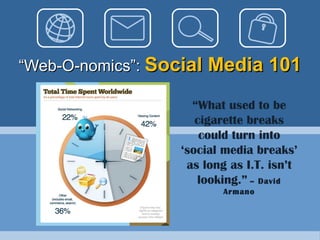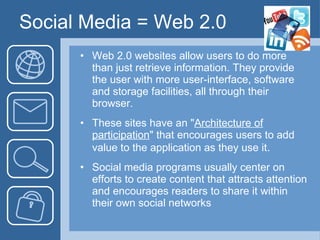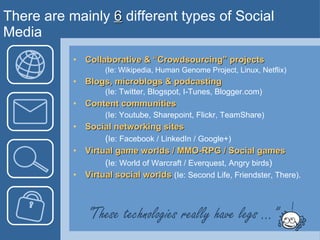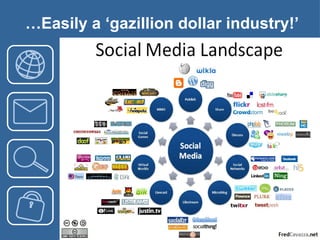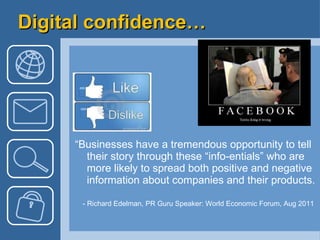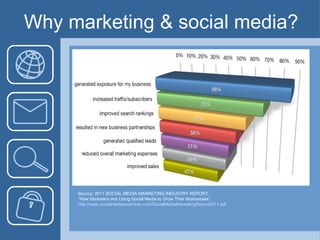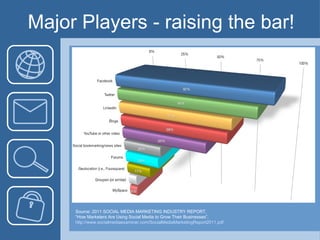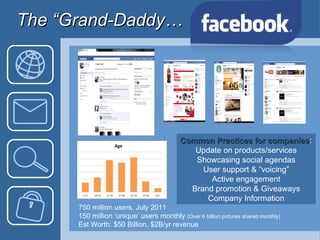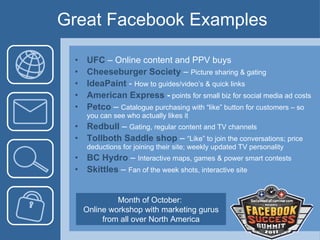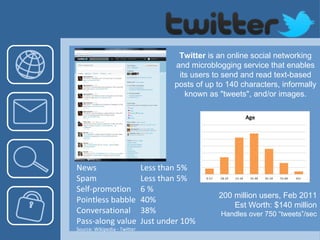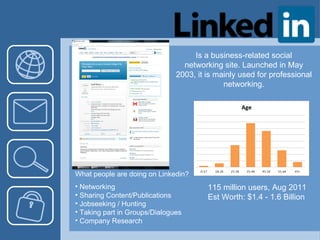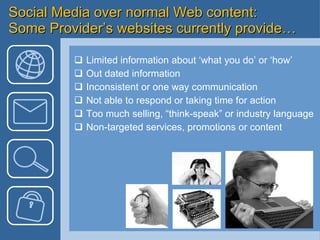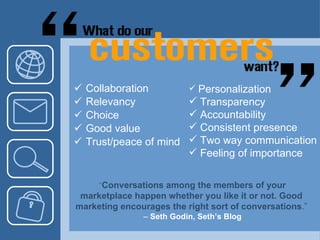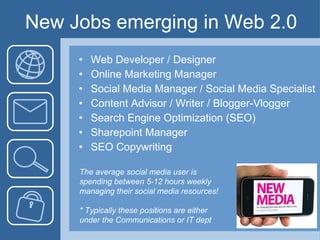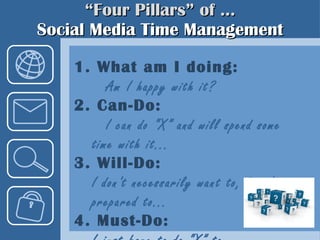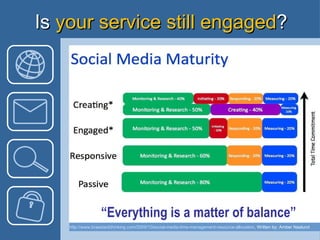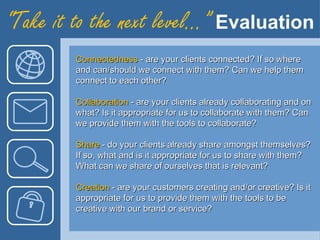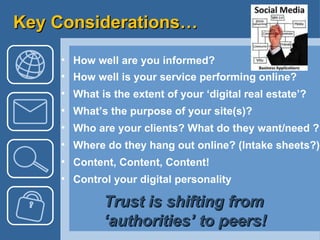Fdns Social Media
- 1. â Web-O-nomicsâ: Social Media 101 â What used to be cigarette breaks could turn into âsocial media breaksâ as long as I.T. isnât looking.â Â â David Armano
- 2. Social Media = Web 2.0 Web 2.0 websites allow users to do more than just retrieve information. They provide the user with more user-interface, software and storage facilities, all through their browser. These sites have an " Architecture of participation " that encourages users to add value to the application as they use it . Social media programs usually center on efforts to create content that attracts attention and encourages readers to share it within their own social networks
- 3. There are mainly 6 different types of Social Media Collaborative & âCrowdsourcingâ projects (Ie: Wikipedia, Human Genome Project, Linux, Netflix) Blogs, microblogs & podcasting (Ie: Twitter, Blogspot, I-Tunes, Blogger.com) Content communities (Ie: Youtube, Sharepoint, Flickr, TeamShare) Social networking sites ( Ie: Facebook / LinkedIn / Google+) Virtual game worlds / MMO-RPG / Social games ( Ie: World of Warcraft / Everquest, Angry birds ) Virtual social worlds (Ie: Second Life, Friendster, There). â These technologies really have legs ...â
- 4. âĶ Easily a âgazillion dollar industry!â
- 5. Digital confidenceâĶ â Businesses have a tremendous opportunity to tell their story through these âinfo-entialsâ who are more likely to spread both positive and negative information about companies and their products. - Richard Edelman, PR Guru Speaker: World Economic Forum, Aug 2011Â
- 6. Why marketing & social media? Source: 2011 SOCIAL MEDIA MARKETING INDUSTRY REPORT, â How Marketers Are Using Social Media to Grow Their Businessesâ, http://www.socialmediaexaminer.com/SocialMediaMarketingReport2011.pdf
- 7. Major Players - raising the bar! Source: 2011 SOCIAL MEDIA MARKETING INDUSTRY REPORT, â How Marketers Are Using Social Media to Grow Their Businessesâ, http://www.socialmediaexaminer.com/SocialMediaMarketingReport2011.pdf
- 8. The âGrand-DaddyâĶ 750 million users, July 2011 150 million âuniqueâ users monthly (Over 6 billion pictures shared monthly) Est Worth: $50 Billion, $2B/yr revenue Common Practices for companies : Update on products/services Showcasing social agendas User support & âvoicingâ Active engagement Brand promotion & Giveaways Company Information
- 9. Great Facebook Examples UFC â Online content and PPV buys Cheeseburger Society â Picture sharing & gating IdeaPaint - How to guides/videoâs & quick links American Express - points for small biz for social media ad costs Petco â Catalogue purchasing with âlikeâ button for customers â so you can see who actually likes it Redbull â Gating, regular content and TV channels Tollboth Saddle shop â âLikeâ to join the conversations; price deductions for joining their site; weekly updated TV personality BC Hydro â Interactive maps, games & power smart contests Skittles â Fan of the week shots, interactive site Month of October: Online workshop with marketing gurus from all over North America
- 10. Twitter is an online social networking and microblogging service that enables its users to send and read text-based posts of up to 140 characters, informally known as "tweets", and/or images. News Less than 5% Spam Less than 5% Self-promotion 6 % Pointless babble 40% Conversational 38% Pass-along value Just under 10% Source: Wikipedia - Twitter 200 million users, Feb 2011 Est Worth: $140 million Handles over 750 âtweetsâ/sec
- 11. Is a business-related social networking site. Launched in May 2003, it is mainly used for professional networking. What people are doing on Linkedin? Networking Sharing Content/Publications Jobseeking / Hunting Taking part in Groups/Dialogues Company Research 115 million users, Aug 2011 Est Worth: $1.4 - 1.6 Billion
- 12. Social Media over normal Web content: Some Providerâs websites currently provideâĶ Limited information about âwhat you doâ or âhowâ Out dated information Inconsistent or one way communication Not able to respond or taking time for action Too much selling, âthink-speakâ or industry language Non-targeted services, promotions or content
- 13. Collaboration Relevancy Choice Good value Trust/peace of mind Personalization Transparency Accountability Consistent presence Two way communication Feeling of importance  â Conversations among the members of your marketplace happen whether you like it or not. Good marketing encourages the right sort of conversations .â â Seth Godin, Sethâs Blog
- 14. New Jobs emerging in Web 2.0 Web Developer / Designer Online Marketing Manager Social Media Manager / Social Media Specialist Content Advisor / Writer / Blogger-Vlogger Search Engine Optimization (SEO) Sharepoint Manager SEO Copywriting The average social media user is spending between 5-12 hours weekly managing their social media resources! * Typically these positions are either under the Communications or IT dept
- 15. â Four Pillarsâ of âĶ Social Media Time Management 1. What am I doing: Am I happy with it? 2. Can-Do: I can do âXâ and will spend some time with it... 3. Will-Do: I don't necessarily want to, but I am prepared to... 4. Must-Do: I just have to do âXâ to...
- 16. Is your service still engaged ? â Everything is a matter of balanceâ http://www.brasstackthinking.com/2009/10/social-media-time-management-resource-allocation , Written by: Amber Naslund
- 17. â Take it to the next levelâĶâ Evaluation Connectedness - are your clients connected? If so where and can/should we connect with them? Can we help them connect to each other? Collaboration - are your clients already collaborating and on what? Is it appropriate for us to collaborate with them? Can we provide them with the tools to collaborate? Share - do your clients already share amongst themselves? If so, what and is it appropriate for us to share with them? What can we share of ourselves that is relevant? Creation - are your customers creating and/or creative? Is it appropriate for us to provide them with the tools to be creative with our brand or service?
- 18. Key ConsiderationsâĶ How well are you informed? How well is your service performing online? What is the extent of your âdigital real estateâ? Whatâs the purpose of your site(s)? Who are your clients? What do they want/need ? Where do they hang out online? (Intake sheets?) Content, Content, Content! Control your digital personality Trust is shifting from âauthoritiesâ to peers!
